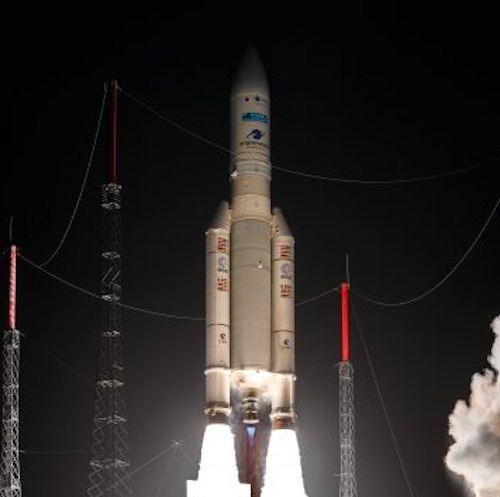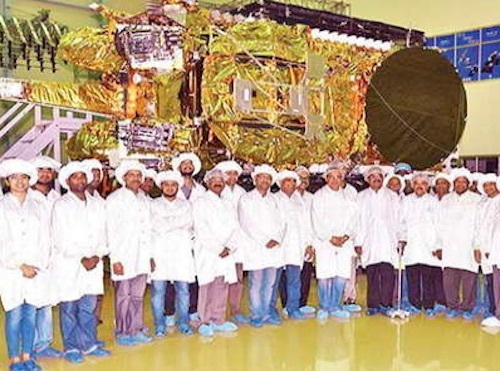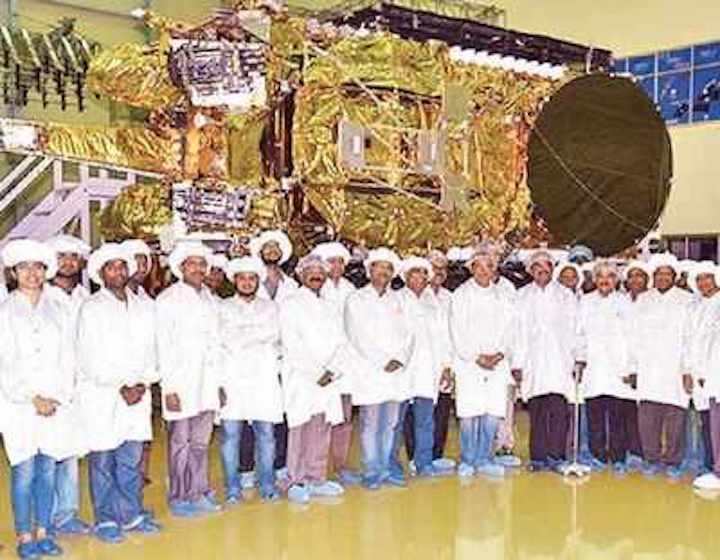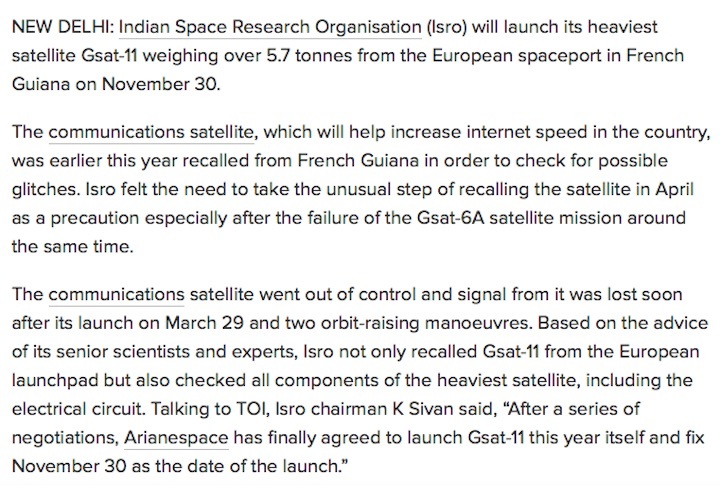26.04.2018
Launch delay for VA243

Due to additional technical checks with the Indian Space Research Organization’s (ISRO) GSAT-11 satellite, to be conducted from the ISRO Satellite Centre (ISAC) located at Bangalore, the Ariane 5 launch initially planned for May 25, 2018, VA243, has been postponed.
The next Arianespace launch will therefore be VA244, in July 2018. An Ariane 5 ES launch vehicle will orbit four more Galileo satellites for the European Commission and the European Space Agency (ESA).
The launch of the Azerspace-2/Intelsat-38 satellite for Azercosmos and Intelsat has been rescheduled for this summer, following VA244. The planned date and the co-passenger will be announced shortly.
The rest of the 2018 Arianespace launch manifest remains unchanged.
Quelle: arianespace
+++
ISRO recalls mega GSAT-11 from Kourou for re-tests
The 5,700-kg satellite was slated for launch on May 26
Just over a fortnight after flying GSAT-11 out to Kourou for launch, the Indian Space Research Organisation has recalled the heaviest communication satellite it has built. The reason is said to be for conducting additional technical checks in Bengaluru, where it was built.
The 5,700-kg high-throughput or Internet broadband satellite had reached French Guiana in South America on March 30 and was slated for launch on May 26 (IST), according to its launch agency Arianespace.
ISRO’s spokesman and officials were not reachable for comment.
The European space transporter said on Tuesday that it has postponed the Ariane 5 launch numbered VA 243 that was initially planned for May 26, 2018 in the wee IST hours “[d]ue to additional technical checks with ISRO’s GSAT-11 satellite, to be conducted from the ISRO Satellite Centre (ISAC) at Bangalore.” GSAT-11 is aimed at providing multiple spot beam coverage in Ka and Ku bands over the Indian region and nearby islands. Its 12 gbps service is expected to be far more superior to older Indian communication satellites.
Technical checks
The satellite and its foreign launch, estimated at Rs. 1,117 crore, was formally approved by the Union Cabinet in March 2016.
Mathieu Weiss, space counsellor in the French embassy in Bengaluru and MD of the India liaison office of French space agency CNES (which is associated with the Ariane rocket design,) said, “These things happen in the space sector. We fully understand that the customer has to make thorough technical checks. The spacecraft being an exceptional satellite, one has to be super cautious in launching it. We will do everything to accommodate ISRO in a forthcoming launch.”
Arianespace had matched and paired GSAT-11 to be flown along with Azerspace-2/Intelsat-38. While GSAT-11 will have to be tested, cleared in the city and flown back to Kourou at least a month before it is launched, its new launch date is not known yet.
Quelle: The Hindu
+++
Update: 14.05.2018
.
All tests on heaviest satellite Gsat-11 to be over by May 17: Isro chief
NEW DELHI: Indian Space Research Organisation (Isro) is currently doing a series of tests on its heaviest communication satellite Gsat-11 weighing over 5.7 tonne after recalling the same from the European spaceport to look for any "potential anomaly".
Talking to TOI, Isro chairman K Sivan said, "We are currently doing tests on Gsat-11 at our Bengaluru's ISRO Satellite Centre (ISAC). All tests, including test on its electrical circuits, are going to be over by May 17."
No anomaly in Gsat-11, will fix launch date: Isro

NEW DELHI: Indian Space Research Organisation (Isro) has found no anomaly in its heaviest satellite Gsat-11 weighing over 5.7 tonnes, which it had recalled from the European spaceport some time back to look for any potential glitch.
ISRO clears GSAT-11 for launch
NEW DELHI: The ISRO has cleared for launch GSAT-11, the satellite which was recalled from Kourou in French Guinea for thorough checks, after losing contact with its another satellite that was launched from Sriharikota in Andhra Pradesh.in March this year, an official said.
The 5,700-kg GSAT-11 satellite was slated for launch on May 26 from Kourou, a site in South America which India uses to launch its heavy-weight satellite.
In a setback to the ISRO, the space agency lost contact with GSAT-6A after it was launched in March this year.
Although the ISRO has been trying to establish with GSAT-6A, a satellite meant for military communication, it has found little success.
This also led to the ISRO recalling GSAT-11 for conducting thorough checks.
ISRO faces costly proposition over recall of GSAT-11
Arianespace has demanded that part of the payment for the two future launches be made before August 15, this paper has learnt.
BENGALURU: French satellite launch firm Arianespace has shot off a letter to the Indian Space Research Organisation (ISRO), forcing on it a condition to launch India’s GSAT-11 communication satellite — that it will be launched only if ISRO sends two of its other communication satellites, GSAT-30 and 31, for Arianespace to launch, The New Indian Express has learnt from reliable sources.
Arianespace has demanded that part of the payment for the two future launches be made before August 15, this paper has learnt.
This could push the launch cost of the satellites, something which could have been avoided. The launch of the two satellites by Arianespace is expected to cost Rs 950 crore. Indian Space Commission had sanctioned `960 crore towards design and manufacturing of GSAT-30, 31 and 32. Sources said following the letter sent to ISRO in mid-July, ISRO petitioned the commission seeking an additional `950 crore to launch GSAT-30 and 31 from Arianespace.
This comes after the Union cabinet cleared Rs 10,900 cr in June for 30 PSLV and 10 GSLV Mk III launches in four years, which would have included GSAT-30 and 31, both initially weighing 2.6 tonnes.
ISRO has decided to increase the lift-off mass of the GSAT-30 and 31 satellites by an additional 500 kg to 3.1 tonnes. This situation, sources in the U R Rao Satellite Centre (URSC) (formerly ISRO Satellite Centre) said, has caused much bitterness among the senior Indian space scientists over extra costs incurred despite having the capability to launch these satellites indigenously from its launchpad at Sriharikota (80 km north of Chennai), using its GSLV-Mk III satellite launcher. The GSLV-Mk III can launch satellites weighing up to 4 tonnes.
The GSAT-11, weighing 5.7 tonnes, had to be launched by Arianespace due to its weight. It is to be a replacement for INSAT-4CR for providing DTH (direct-to-home) connectivity and other services to many operators.
COSTLY OPPOSITION
The opposition of former Space Applications Centre Director Tapan Mishra to this proposal by ISRO, succumbing to Arianespace, resulted in his subsequent transfer, say sources in ISRO.
A highly placed ISRO official said, “Tapan Mishra, former Applications Director, was among those who had opposed the decision of increasing the weight of the satellites during the Contract Committee meeting soon after Arianespace had written the letter.”
ISRO has claimed it was seeking the services of the French firm due to “uprating failure” of the indigenously developed GSLV-Mk III to launch GSAT-30 and 31, which were scheduled to be launched on board the GSLV Mk III at 60% of the cost charged by Arianespace.
RECALLING SATELLITE WAS THE TRIGGER
The New Indian Express has learnt that all this was caused due to GSAT-11 being recalled from Kourou where it was sent for the May 2018 launch. Based on a report of a former director of URSC regarding the failure GSAT-6A, the launch of GSAT-11 was delayed and the satellite was shipped back to India from Guiana Space Centre, French Guiana, to check for possible flaws in the satellite. The cost of transport along with transit insurance was estimated to be Rs 90 crore.
The recall was for carrying out “modifications” to prevent any repeat of power systems failure that had occurred in March-end on board GSAT-6A, with which ISRO’s ground stations lost contact following a launch from Sriharikota on March 29, 2018.Sources in URSC sad the decision to ship the satellite back to India was made despite opposition from directors of various ISRO divisions. The decision resulted in ISRO missing the launch date of an important communication satellite. Soon after, Arianespace said it could only provide a launch window at the end of 2019 as ISRO had missed its schedule.
As ISRO was in a pickle with Arianespace, the French firm provided a new window of November 2018 for launch. Now, this delay and the missing of the May launch window due to the GSAT-11’s recall to India has come as a gift for the French firm which appears to have decided to force ISRO into an agreement for launching two additional satellites. Sources said the directors had insisted that adequate care had already been taken to prevent a GSAT-6A-like failure on board GSAT-11 and that it was not necessary to ship the satellite back to India.
PENALTY CLAUSE NOT INVOKED
As the recall led to missing of the May launch window, there is actually a penalty clause imposable on ISRO. The penalty amounted up to 5% of the Rs 550 crore estimated to be the launch cost of GSAT-11. Despite such a clause existing in the GSAT-11 contract for such eventualities, ISRO did not activate the penalty clause and instead chose to send a proposal to the Space Commission for release of additional funds to the tune of Rs 950 crore. The proposal sought permission to procure launch facilities for GSAT-30 and 31 from Arianespace.
NO RESPONSE
TNIE sent a set of questions to ISRO Chairman Dr R Sivan and Rajendra Singh Byali, Director of Publications and Public Relations unit, on June 26. A response is still awaited. TNIE also reached out to members of the Space Commission. While former ISRO chairman and member of the Commission A S Kiran Kumar said he was “not aware of the issue”, another member - who did not wish to be quoted - refused to respond.
Quelle: THE NEW INDIAN EXPRESS
---
Update: 6.08.2018
.
Isro’s heaviest sat launch from French Guiana on Nov 30: Sivan


Quelle: The Times of India
---
Update: 13.08.2018
.
Arianespace to launch three more heavy Indian satellites
Contrary to earlier reports, ISRO has decided to launch the two heavier satellites GSAT-31 and GSAT-30 on Ariane-5 to replace INSAT-4CR.

ISRO Chairman K Sivan
-
BENGALURU: Global commercial launch provider Arianespace would launch three more heavy Indian satellites from its rocket port at Kourou in French Guiana over the next 9 months, a top space official said on Sunday.
"Arianespace will launch GSAT-11 on November 30, followed by GSAT-31 in December and GSAT-30 in May 2019," state-run Indian Space Research Organisation (ISRO) Chairman K. Sivan told reporters at an event here.
"GSAT-11 will be sent to Kourou in mid-October for launch on board Arian-5 rocket of Arianespace," said Sivan after the unveiling of the bust of Indian space pioneer Vikram Sarabhai at the space headquarters to mark his 99th birth anniversary.
Contrary to earlier reports, ISRO has decided to launch the two heavier satellites GSAT-31 and GSAT-30 on Ariane-5 to replace INSAT-4CR whose life gets over in January and INSAT-4A, as its life span ends in July 2019.
"Unless we launch the two satellites (GSAT-31 & GSAT-30) before the lifespan of earlier satellites end, we will have no telecast link and direct-to-home (DTH) services in the country," pointed out Sivan.
INSAT-4CR was launched on September 2, 2007 by ISRO on GSLV-F04 from Sriharikota and INSAT-4A was launched from Kourou on December 22, 2005.
Though ISRO planned to launch GSAT-31 and GSAT-30 on its heavy rocket GSLV Mk-2 (Geo-Stationary Launch Vehicle-Mark 2), it gave up the move as the life of the two spacecraft would be for only three years and not 15 years as intended to be.
As the GSLV Mark-3 will be used to launch India's second lunar mission Chandrayaan-2 with a lander and rover on January 3, the space agency is compelled to launch the two replacing heavy satellites on Arian-5.
"As per Arianespace protocol, the launch date must be signed four months prior to lift-off. We need to launch GSAT-31 by December 15 as the satellite (INSAT-4CR) to be replaced has a lifespan till January," added Sivan.
In this context, Sivan admitted that the space agency has limitations in making more heavier rockets (GSLV) than lighter rockets like the Polar Launch Satellite Vehicle (PSLV), which are used for putting spacecraft in the earth's lower orbit for common man's services.
Quelle: The New Indian Express
